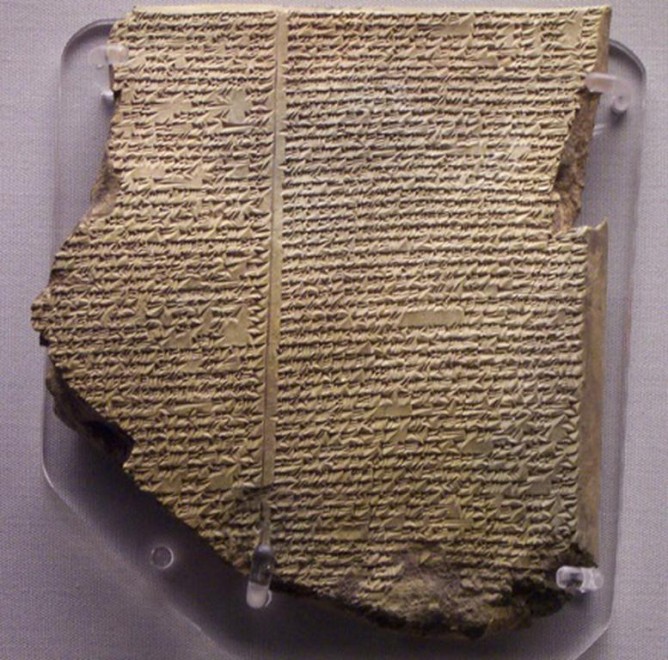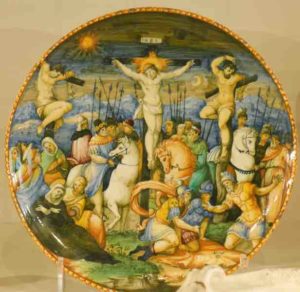The Creation and the Flood
Enuma Elish “When in high” Babylonian tablet of the Creation
The Babylonian poem of the creation (Enuma Elish “when in high”), written in the first millennium BC, was discovered in the 19th century, in the excavations of the city of Nineveh, one of the capitals of the Assyrian empire.
This text in Assyrian language written on eight tablets contains more than thousand verses and tells the birth of the gods, the formation of the world and of man. It founds the supremacy of Marduk, the god of Babylon, over the other gods.
Theogony (birth of the gods)
Gentle family murders
Tablet 1: The fresh water (Absu) and the salt water (Tiamat) give birth to a series of deities who engage in rivalries and murders among them.
Tiamat asks Absu to punish his fidgety sons. Ea sends Absu, his father, to sleep, kills him, settles into his dead body and gives birth to Marduk.
Ugly, stupid and nasty!
To avenge the death of her husband, Tiamat creates nine invincible monsters against her sons.
Tablet 2: The threatened gods send delegations of gods to appease Tiamat, but in vain.
Marduk accepts to defeat Tiamat, provided that he becomes the leader of all the gods.
Tablets 3 and 4: Marduk is proclaimed king.
The Babylonian creation of the world
Marduk kills Tiamat and opens his body like a shell.
With the top, he makes the sky with the abode of the gods; he sets up the stars, the moon, the sun (tablet 5).
With the lower part, he shapes the mountains, he sets up the rivers (Tigris and Euphrates). He creates the heaven and the earth and establishes kings. The gods honor him and confirm his kingship.
The creation of mankind
Tablet 6: Marduk decides to create mankind to make them work and so the gods can rest.
To make mankind, Marduk needs the blood of a guilty god. Kingu is sacrificed, because he had urged Tiamat to make war. With his blood Marduk shapes mankind.
Down to work!
Marduk said, “Build Babylon, make its bricks; you will call the sanctuary Anunaku (senior gods).” The Anunakus mold bricks and build a temple, a tower with many stories (ziggurat).
Marduk orders to build the tower with many stories of Babylon with molded bricks in honor of the superior gods (Anunaku)
The Epic of Gilgamesh [1] and the flood
Tablet 11 with the flood story comes from the library of Ashurbanipal in Nineveh in the 7th century BC.
The gods have decided to cause the flood, because men bother them with all their noise, but Enki (Ea) does not agree.
He warns a man by a noise in the reeds that says “Destroy your house, build a boat.”
The man builds a boat. He loads it with silver, gold, his family, his in-laws, livestock and artisans, that is a lot more people than in Noah’s ark.
The flood beats down on earth. The waters rise. The gods are very afraid. After seven days the storm calms down. The boat docks on a mountain. After seven more days, the man releases a dove. Then he leaves the ship, offers a sacrifice – and the gods approach smelling the odor.
 Enlil who ordered the flood is furious when he sees the boat: nobody should have escaped the disaster. Enki (Ea) tries to reason Enlil: it would be better to use other means to punish men (lion, wolf, famine and plague) than the flood. Enlil seems convinced as he steps into the boat and gives man immortality.
Enlil who ordered the flood is furious when he sees the boat: nobody should have escaped the disaster. Enki (Ea) tries to reason Enlil: it would be better to use other means to punish men (lion, wolf, famine and plague) than the flood. Enlil seems convinced as he steps into the boat and gives man immortality.
The survivor of the flood entrusted Gilgamesh the plant of immortality. It stings like a rose, but if he keeps it in his hands, he will get life. Unfortunately he bathes in a well and a snake attracted by the scent carries the rose away. Now it becomes impossible to achieve immortality.
The Epic of Atrahasis [2] combines the Creation and the Flood
No wonder with such names!
Tablet 1: There are two classes of gods, the superior gods (anunaku) and the inferior gods (zigigu), subject to forced labor for the higher gods.
Already proletarian revolution!
After 2500 years on fatigue, the inferior gods revolt. The superior gods are trying to fix the situation.
Made to work
The midwife of the gods, Mamou, makes of clay mixed with the blood of a god seven men and seven women to be slaves of the gods.
But too disturbing
But mankind multiply on the earth. They become loud and prevent Enlil from sleeping. He tries to reduce the number of mankind with the epidemic, drought (tablet 2), starvation.
Enki helps mankind to fight against these scourges.
Enlil decides to use a flood.
Enki warns Atrahasis, who builds a boat (tablet 3).
The flood beats down on earth. Atrahasis, having escaped the deluge, offers a sacrifice. Enlil is furious. The end of the story resembles that of Gilgamesh; the number of humans is limited by sterility, infant death, religious celibacy.
Biblical narrative and parallel legends
At the time of the discovery of these texts, similarities were noticed with the biblical narrative: creation of man from clay, sending out of birds and sacrifice after the flood.
Are we faced with mythological texts adapted later on to the Jewish faith?
or rather with authentic spiritual traditions of the Bible distorted into mythological stories?
The pagan texts have been written before the biblical text.
BUT the biblical text did neither copy nor adapt them
Authenticity and superiority of the biblical narrative
Monotheism (one God) # polytheism (many gods)
In mythology : theogony (gods begotten)
# In the biblical account : one God, eternal, without beginning or end
The pagan gods are created as a result of fighting or conflicts of interest: this is convenient to explain the events of everyday life.
In mythology, there is an origin for all, even for the gods
# In the biblical account, God creates “ex nihilo” out of nothing
Biblical creation needs neither creating angels nor intermediaries.
Babylonian deities are put in their place as creatures.
The sun and moon are not named but reduced to the rank of big lights.
Mixture (pagan texts) # distinction (biblical narrative) between the Creator and the creature
In pagan texts, the gods are born and work as men.
Man is created with clay mixed with blood and saliva. There are intermediate beings. Gilgamesh became like a god.
# In the biblical account, the divine element in man is the breath of life from God
“To be like God”: this is the temptation by the serpent
Man is created in the image, in the likeness of God.
Psalm 8: “You have made him a little lower than God”.
The difference is that God has life in himself and ultimately distinguishes between good and evil.
The human being is created out of love (biblical account)
# to serve the gods (pagan texts)
The man and the woman, created by God, are placed in the garden to till it and keep it, only after the creation.
A child is born by the love of his parents – not to do the washing-up or to take care of them in their old age. The mythological text is a pagan way of presenting the creation of mankind.
The human being, an individual and role of women (biblical account)
# Neither a couple nor an individual, but seven couples (pagan text)
Evil and death
In mythology, death was decided by the gods at the very moment of the creation of mankind.
Evil is already there before the appearance of man : parricide struggles between divine “nobility and proletariat”.
Man is created with the blood of an evil god.
# In the biblical account the creation is good
Evil and death came through the fault of humans
Death is natural (you will return to dust) but abnormal. It was not God’s intention: the tree of life was evident in the garden.
To be continued
C.S.
[1] semi-legendary king of the city of Uruk
[2] Mesopotamian legendary hero who had escaped the flood.



